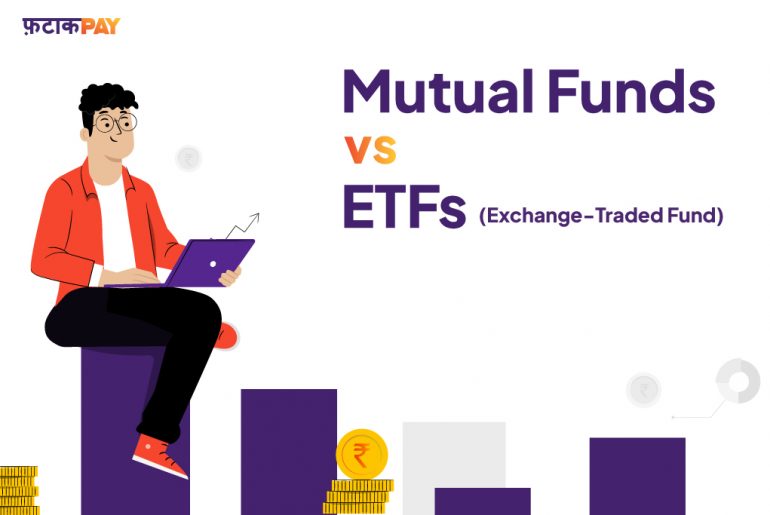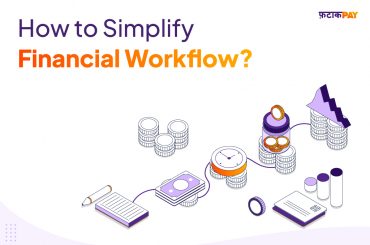Introduction:
ETFs and Mutual Funds have quite similar characteristics. Its functionality and related risks vary, nevertheless. To make an informed choice, be aware of these variations.
Mutual funds and ETFs both share some characteristics. But, there are several significant distinctions that define ETFs and Mutual Funds apart. They both possess a wide range of distinct assets. We’ll go into detail about ETFs vs. Mutual Funds in this blog.
What is an ETF?
Exchange Traded Funds (ETFs) are passive investment products that replicate a particular index. ETFs monitor an index’s performance.In this case, there is no requirement for a portfolio manager. Also, these funds don’t try to outperform the corresponding index. An ETF is a small percentage of shares in the index. For example, if an ETF is 1/100th of a benchmark index and the index level is 1354, then one unit of the ETF will be available at Rs. 13.54.
On the trading exchange, the process of buying and selling ETFs is easy. Throughout the day, the ETF’s price may change. There are different structures and forms of ETFs.
What are Mutual Funds?
Mutual Funds are actively managed by Fund/Portfolio managers. It combines funds from many investors. The money gathered from various investors is then invested into a variety of financial instruments, to create a portfolio.
With the help of diversification, Mutual Funds may be able to help investors. Mutual Funds, for instance, buy government bonds. For a layman, it is incredibly difficult to buy government bonds on his own.
The fund manager’s investment decisions are based on his philosophy and goals. Mutual fund investments have one advantage over stock market investments is that stock market investments involve a lot of research effort and investigation. Investors in Mutual Funds may not necessarily bother about researching the stock market, as the funds are managed by a Mutual Fund manager.
The fluctuation of price of the underlying assets affects the market value of the portfolio. Portfolio Value = Total Net Assets / quantity of outstanding units. This is also known as Net Asset Value (NAV). A greater NAV reflects an increase in the value of the portfolio, whereas a lower NAV shows a decrease in the value of the portfolio.
For more information about Mutual Funds, you can check out our previous blog:
https://fatakpay.com/blog/different-types-of-investments/
Key differences between ETFs and Mutual Funds:
| Parameters | ETFs | Mutual Funds |
| Portfolio Management | Passively managed portfolios. These funds merely track the index. | Actively managed funds by a fund manager. |
| Trading Convenience | Freely traded in the market. Investors are free to buy and sell as they see fit. Like common equity shares, the market price of an ETF is accessible in real-time. The price of the ETF is always changing. | Only by submitting a request to the fund house can investors purchase and sell mutual fund units. The market price of the fund is determined by its NAV. NAV, thus, represents the price of each unit of a mutual fund. |
| Management fees involved | ETFs mirror the performance of the index, therefore they do not require active portfolio management. Thus, the fund management fees and other costs related to investing in ETFs are minimal (including expense ratio) | On behalf of the investors, the fund manager actively makes investment decisions. As a result, fund management costs are greater. The expense ratio of the fund is reflected in these fees. The expense ratio of a Mutual Fund increases in direct proportion to the fees. |
| Tax efficiency | ETFs frequently have lesser capital gains for investors. Hence lesser taxes. | Even shareholders who may have an unrealized loss on their total mutual fund investment are potentially eligible to receive capital gains from the sale of securities held by the mutual fund. Hence more taxes. |
| Liquidity | More liquidity because it is independent of daily trade volume. Stocks featured in the index and ETF liquidity are both correlated. | Lower liquidity when compared to ETFs. |
| Lock-in Period | No Lock-in Period. The investors have the liberty to sell their investments whenever they want to. | ELSS Mutual Funds have a lock-in period of 3 years. Apart from this, other mutual funds do not have a lock-in period. |
So should I go for ETFs or Mutual Funds?
To answer this question, we would like to state the factors before deciding upon which investment instrument to choose:
- Investor’s risk tolerance level
- Investors time horizon
- Investor’s Financial goals
- The tax savings strategy
- Liquidity of investment
Based on these factors, the investors can take a call on whether to prioritise mutual funds over ETFs or vice versa. Some investors make liquid investments their top most priority over long-term investments. Exchange Traded Funds (ETFs) provide greater flexibility and superior short-term returns.
Mutual fund investors hold their investments for a longer duration, which enables them to amass a lot of returns (provided the fund does well).
To invest in an Exchange Traded Fund in India, a person needs to have a demat account or a trading account. ETFs are not suitable for investors who find the process of opening a demat account or a trading account full of hassles.
Yet, using Index Mutual Funds, investors can decide to invest in passively managed indices. Index Mutual Funds replicate the portfolio structure of a market index. An investor might decide to invest money into an ETF Index Fund managed by an Asset Management firm.
Closing Thoughts:
ETFs and mutual funds have very similar characteristics. To create a diverse portfolio, an investor might combine different investment vehicles wisely and healthily. Yet, as an investor, they must be aware of how each of these funds operate. Investors must also evaluate the market risks. We recommend you to speak to a financial advisor.
We hope you enjoyed reading the blog! Do check out our other blogs and LinkedIn articles:
https://fatakpay.com/blog/different-types-of-investments/
https://fatakpay.com/blog/the-right-way-to-plan-your-retirement/







